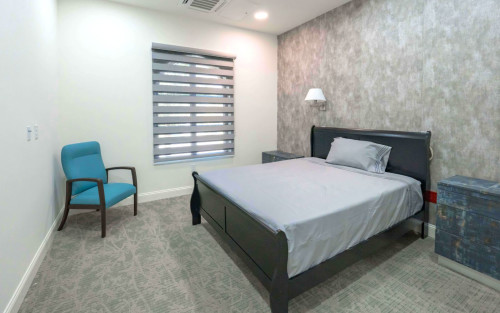






Virtue Recovery Corbett
This provider's information has been quality-checked by Recovery.com's Research Team for accuracy and completeness, including center verification through appropriate third-party organizations.
Treatment Focus
This center treats primary substance use disorders and co-occurring mental health conditions. Your treatment plan addresses each condition at once with personalized, compassionate care for comprehensive healing.
Primary Level of Care
Offering intensive care with 24/7 monitoring, residential treatment is typically 30 days and can cover multiple levels of care. Length can range from 14 to 90 days typically.
Treatment Focus
This center treats primary substance use disorders and co-occurring mental health conditions. Your treatment plan addresses each condition at once with personalized, compassionate care for comprehensive healing.
Primary Level of Care
Offering intensive care with 24/7 monitoring, residential treatment is typically 30 days and can cover multiple levels of care. Length can range from 14 to 90 days typically.
Provider's Policy
Insurance May Cover Up To 100% Of Treatment. If you have medical insurance from a major insurance provider, your treatment costs may be partly or entirely covered. All personal information is secured and completely confidential. Our admissions coordinators will interact directly with your insurance provider on your behalf, removing from your shoulders the burden of figuring out if your insurance will pay for your treatment. Our goal is to ensure that you or your loved one receives the maximum coverage possible, and we will work closely with you to develop an affordable payment plan for any unforeseen out-of-pocket copay or deductible expenses.
Virtue Recovery Corbett
Virtue Recovery Corbett
About Virtue Recovery Corbett
Virtue Recovery in Las Vegas, Nevada provides customized detox, residential, day treatment (partial hospitalization), and outpatient programs that begin with a professional evaluation to create tailored treatment plans. They treat drug and alcohol addiction, co-occurring mental health conditions like anxiety and depression, and eating disorders such as anorexia, bulimia, and binge eating. Virtue Recovery strives to create a nurturing, supportive environment where clients can fully immerse themselves in therapy to bolster lasting recovery.
Detox and Addiction Treatment
In their medical detox program, Virtue Recovery’s healthcare professionals evaluate clients’ medical history, substance use history, and current health status to create a personalized detox plan tailored to specific needs. Throughout the detox process, medical staff will closely monitor vital signs and overall health. Medication-assisted treatment is available as needed. Clients can engage in individual and group therapy as well as psychoeducation. Virtue Recovery provides nutritious meals to fuel the body and massage and acupuncture for comfort. Clients’ case manager guides them every step of the way to help them transition to their residential or outpatient programs.
A Continuum of Comprehensive Care for Dual-Diagnosis Recovery
Virtue Recovery offers multiple levels of care to meet clients where they are, including intensive inpatient, residential, day treatment, and intensive outpatient programs. They can treat co-occurring personality disorders, depression, anxiety disorders, and other mental health concerns. Clients heal in individual, group, and family settings using evidence-based therapies such as cognitive behavioral therapy (CBT), motivational interviewing, and dialectical behavior therapy (DBT). They offer eye movement desensitization and reprocessing (EMDR) for clients with post-traumatic stress disorder (PTSD) and transcranial magnetic stimulation (TMS) clients with treatment-resistant depression. Virtue Recovery provides a robust family program for loved ones to heal and grow together. Tailored to families’ specific needs, the family therapist may use systemic family therapy, solution-focused brief therapy (SFBT), multidimensional family therapy (MDFT), and more.
Holistic Treatment and Eating Disorder Recovery
Virtue Recovery strengthens physical, emotional, mental, and spiritual health through holistic therapies like art therapy, yoga, and meditation practices. Acupuncture, massage therapy, nutrition counseling, and self-care practices are available, as well.
Virtue Recovery offers a specialized eating disorder program treating anorexia nervosa, bulimia nervosa, binge eating disorder, other specified feeding or eating disorder (OSFED), and avoidant food restrictive intake disorder (ARFID). 24/7 monitoring is available, and clients participate in individual and group therapies customized to their recovery needs. This program aims to:
- Stabilize eating patterns
- Teach awareness to the body’s cues and signals
- Honor the bodies’ wants and needs
- Help clients follow their meal plan outside of a treatment setting
- Decrease distress related to food and the body through exposure exercises
- Educate and change cognitive distortions

Highlights from the Center
Highlights
These highlights are provided by and paid for by the center.
Customized Treatment Plans
Holistic Approach
Medically Assisted Detox
Eating Disorders Program
Center Overview
Treatment Focus
This center primarily treats substance use disorders, helping you stabilize, create relapse-prevention plans, and connect to compassionate support.
Joint Commission Accredited
The Joint Commission accreditation is a voluntary, objective process that evaluates and accredits healthcare organizations (like treatment centers) based on performance standards designed to improve quality and safety for patients. To be accredited means the treatment center has been found to meet the Commission's standards for quality and safety in patient care.

Insurance Accepted
Cash Pay Rates
Estimated Cash Pay Rate
Center pricing can vary based on program and length of stay. Contact the center for more information. Recovery.com strives for price transparency so you can make an informed decision.
Luxury rehab centers offer a unique blend of luxurious amenities and high-quality treatment. From private suites to gourmet dining, personal trainers to spa treatments, these facilities provide a high level of comfort and discretion.





Levels of Care









Treatment
Specializations
Benzodiazepines
Benzodiazepines are prescribed to treat anxiety and sleep issues. They are highly habit forming, and their abuse can cause mood changes and poor judgement.
Co-Occurring Disorders
A person with multiple mental health diagnoses, such as addiction and depression, has co-occurring disorders also called dual diagnosis.
Drug Addiction
Drug addiction is the excessive and repetitive use of substances, despite harmful consequences to a person's life, health, and relationships.
Heroin
Heroin is a highly addictive and illegal opioid. It can cause insomnia, collapsed veins, heart issues, and additional mental health issues.
Opioids
Opioids produce pain-relief and euphoria, which can lead to addiction. This class of drugs includes prescribed medication and the illegal drug heroin.
Eating Disorders
An eating disorder is a long-term pattern of unhealthy behavior relating to food. Most people with eating disorders have a distorted self-image.
Detox
Detox fully and safely removes toxic substances from the body, allowing the next steps in treatment to begin with a clean slate.
Alcohol
Using alcohol as a coping mechanism, or drinking excessively throughout the week, signals an alcohol use disorder.
Who We Treat
Veterans
Patients who completed active military duty receive specialized treatment focused on trauma, grief, loss, and finding a new work-life balance.
Men and Women
Men and women attend treatment for addiction in a co-ed setting, going to therapy groups together to share experiences, struggles, and successes.
Young Adults
Emerging adults ages 18-25 receive treatment catered to the unique challenges of early adulthood, like college, risky behaviors, and vocational struggles.
Executives
Executive treatment programs typically directly support the needs of people who manage businesses and may provide flexible schedules and office space to allow work during treatment.
Professionals
Busy, high-ranking professionals get the personalized treatment they need with greater accommodations for work, privacy, and outside communication.
Approaches
Twelve Step
Incorporating spirituality, community, and responsibility, 12-Step philosophies prioritize the guidance of a Higher Power and a continuation of 12-Step practices.
Holistic
A non-medicinal, wellness-focused approach that aims to align the mind, body, and spirit for deep and lasting healing.
Evidence-Based
A combination of scientifically rooted therapies and treatments make up evidence-based care, defined by their measured and proven results.
Individual Treatment
Individual care meets the needs of each patient, using personalized treatment to provide them the most relevant care and greatest chance of success.
Therapies
Seeking Safety
Not looking to the past, patients improve their present circumstances. They work toward safety without detailing traumatic events.
Spiritual Care
Tending to spiritual health helps treatment become more effective, allowing patients to better cope with their emotions and rebuild their spiritual wellbeing.
1-on-1 Counseling
Patient and therapist meet 1-on-1 to work through difficult emotions and behavioral challenges in a personal, private setting.
Family Therapy
Family therapy addresses group dynamics within a family system, with a focus on improving communication and interrupting unhealthy relationship patterns.
Twelve Step Facilitation
12-Step groups offer a framework for addiction recovery. Members commit to a higher power, recognize their issues, and support each other in the healing process.
Psychoeducation
This method combines treatment with education, teaching patients about different paths toward recovery. This empowers them to make more effective decisions.
Art Therapy
Visual art invites patients to examine the emotions within their work, focusing on the process of creativity and its gentle therapeutic power.
Conditions We Treat
Post Traumatic Stress Disorder
PTSD is a long-term mental health issue caused by a disturbing event or events. Symptoms include anxiety, dissociation, flashbacks, and intrusive thoughts.
Anxiety
Anxiety is a common mental health condition that can include excessive worry, panic attacks, physical tension, and increased blood pressure.
Depression
Symptoms of depression may include fatigue, a sense of numbness, and loss of interest in activities. This condition can range from mild to severe.
Schizophrenia
Schizophrenia is a serious mental health condition that causes hallucinations, delusions, and disordered thinking.
Grief and Loss
Grief is a natural reaction to loss, but severe grief can interfere with your ability to function. You can get treatment for this condition.
Codependency
Codependency is a pattern of emotional dependence and controlling behavior. It's most common among people with addicted loved ones.
Suicidality
With suicidality, a person fantasizes about suicide, or makes a plan to carry it out. This is a serious mental health symptom.
Obsessive Compulsive Disorder (OCD)
OCD is characterized by intrusive and distressing thoughts that drive repetitive behaviors. This pattern disrupts daily life and relationships.
Pornography Addiction
A person with a porn addiction is emotionally dependent on pornography to the point that it interferes with their daily life and relationships.
Gambling
Excessive, repetitive gambling causes financial and interpersonal problems. This addiction can interfere with work, friendships, and familial relationships.
Substances We Treat
Cocaine
Cocaine is a stimulant with euphoric effects. Agitation, muscle ticks, psychosis, and heart issues are common symptoms of cocaine abuse.
Prescription Drugs
It's possible to abuse any drug, even prescribed ones. If you crave a medication, or regularly take it more than directed, you may have an addiction.
Benzodiazepines
Benzodiazepines are prescribed to treat anxiety and sleep issues. They are highly habit forming, and their abuse can cause mood changes and poor judgement.
Ecstasy
Ecstasy is a stimulant that causes intense euphoria and heightened awareness. Abuse of this drug can trigger depression, insomnia, and memory problems.
Co-Occurring Disorders
A person with multiple mental health diagnoses, such as addiction and depression, has co-occurring disorders also called dual diagnosis.
Psychedelics
Hallucinogenic drugs—like LSD—cause euphoria and increased sensory experiences. When abused, they can lead to depression and psychosis.
Drug Addiction
Drug addiction is the excessive and repetitive use of substances, despite harmful consequences to a person's life, health, and relationships.
Chronic Relapse
Consistent relapse occurs repeatedly, after partial recovery from addiction. This condition requires long-term treatment.
Languages
Aftercare
Experience
Personal Amenities
Amenities
Special Considerations
First Responders Program
Paramedics, police officers, firefighters, and others join in a specific First Responders program, usually focused on trauma, grief, and work-life balance.
Activities
Yoga
Yoga is both a physical and spiritual practice. It includes a flow of movement, breathing techniques, and meditation.

What people are saying
Accommodations
Food & Nutrition
Treatment
Value
Pros
- Gourmet & Nutritious Food (3)
- Beautiful Location (4)
- Straightforward Costs & Expectations (2)
- Luxurious Accommodations (4)
See More
Terry W
Charles M
Stephen F
LM
We love hearing about your treatment experience
Help individuals and families seeking treatment by sharing your first-hand experience with this treatment provider. Review Guidelines.





